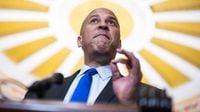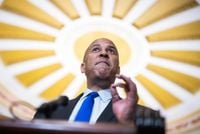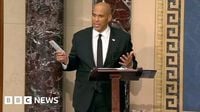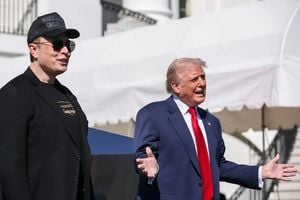US Senator Cory Booker has made history by breaking the record for the longest speech ever delivered in the Senate, a remarkable feat that lasted for 25 hours and four minutes. The New Jersey Democrat's marathon address, which began on the evening of April 1, 2025, and concluded at 20:06 on April 2, was a symbolic protest against the policies of President Donald Trump. In his speech, Booker warned of a "grave and urgent" moment in American history, emphasizing the critical state of the nation.
While Booker's speech was not classified as a filibuster—typically aimed at obstructing legislative business—it effectively held up proceedings in the Republican-controlled Senate. The previous record for the longest Senate speech was held by Republican Senator Strom Thurmond, who spoke for 24 hours and 18 minutes in 1957 against the Civil Rights Act.
As he began his address around 19:00 local time, Booker, who is the fourth-ranking Democrat in the chamber, expressed his determination to speak for as long as he was physically able. Throughout his lengthy discourse, he filled the time with various activities, including reading letters from constituents who reported being adversely affected by Trump's policies. He also discussed sports, recited poetry, and engaged in dialogue with colleagues.
Booker, who is African-American, poignantly reflected on his heritage as a descendant of both slaves and slave-owners. "I'm here because as powerful as he was, the people are more powerful," he stated, referencing Thurmond's record-setting speech from 68 years ago. This connection to history underscored the significance of Booker's protest.
As the hours wore on, Booker humorously remarked, "I, first amongst us all, really love to speak," just before he surpassed the previous record. He acknowledged the physical challenges of his endeavor, particularly as he neared the milestone, saying, "I want to go a little bit past this and then I'm going to deal with some of the biological urgencies I'm feeling." The rules governing such speeches require the speaker to remain standing and forgo bathroom breaks, adding to the difficulty of his task.
Despite the challenges, Booker was able to take brief moments to defer to colleagues who shared his concerns, including Senate Minority Leader Chuck Schumer and Senators Dick Durbin and Kirsten Gillibrand. Their engagement provided him with necessary breaks and a supportive atmosphere during his lengthy address.
The Democratic Party, currently out of power in the White House, Senate, and House of Representatives, rallied behind Booker's symbolic act of protest. Senator Raphael Warnock expressed gratitude to Booker for his efforts, stating on the Senate floor, "I just want to thank you for holding vigil for this country all night." This sentiment reflected the party's solidarity in the face of what they perceive as a national crisis.
Booker's speech marks the longest seen in the Senate since Texas Senator Ted Cruz's 21-hour filibuster against Obamacare in 2013. Cruz, who previously held the record, acknowledged the physical demands of such an endeavor, stating that a filibuster is a challenging physical feat. In a humorous response to Booker's achievement, Cruz posted a meme of Homer Simpson crying on social media.
As the Senate continues its legislative business, Booker's record-setting speech serves as a reminder of the power of words and the importance of taking a stand on issues that matter to constituents. His marathon address not only broke a record but also highlighted the ongoing political and social struggles in America.
In a time when political discourse is often polarized and contentious, Booker's historic speech resonates as a call to action for many, urging fellow lawmakers and citizens alike to reflect on the state of the nation and the importance of civic engagement. As he concluded his speech, the impact of his words lingered in the Senate chamber, a testament to the enduring strength of democratic dialogue.






